On the afternoon of December 12, 2022, the special lectures on Developing Agriculture and Empowering Rural Areas via Digital Business of the Luojia SIM + E-commerce Forum, and the events and activities of the 20th anniversary of the establishment of the E-commerce major, School of Information Management, Wuhan University were held as scheduled.
Lili Cui, Professor in the School of Information Management and Engineering, Executive Director of E-commerce Institute at Shanghai University of Finance and Economics, was invited to give an academic report.
Jun Zhang, Associate Professor at our School, presided over the event.

With the topic of How the Practical Issues of Rural Areas, Agriculture and Farmers Could be Published in the Top-tier International Journals of Information System, combined with her own publishing experience in top-tier international journals of information system, Lili Cui analyzed the scientific research opportunities in rural e-commerce and digital villages.
Based on the industrial status of rural e-commerce in China, she summarized three main points of future development in this field as followings:
Firstly, the development of rural e-commerce should conform to the strategy of rural revitalization;
Secondly, the construction of rural e-commerce should adapt to the overall trend of e-commerce development in China and realize the transformation from consumer internet to industrial internet;
Thirdly, the promotion of rural e-commerce should be consumer-oriented and cater to consumers' needs for a better life.
Regarding the scientific research environment in rural e-commerce, Lili Cui pointed out that with the improvement of research in related fields, it is increasingly difficult to achieve breakthrough results and publish articles in world-level journals. The difficulty in achieving breakthrough results lies in innovation. The innovation in research is in two levels mainly: one is to extract academic concepts through phenomena and discover essential laws; The second is to enhance the understanding and cognition of the phenomenon on the existing basis through specific examples. She gave some suggestions on topic selection, data acquisition and theoretical construction. She expressed that good research needs to be unique in the choice of research phenomena, and at the same time, it should have a special vision for the construction of theoretical framework. To explore a good research phenomenon, we need to do the following actions: continuously scan trend phenomenon, think deeply about the essence of the phenomenon, and establish a connection between the phenomenon and the research field and journal’s interest. In the process of exploring phenomenon, it can better reflect innovative thinking by choosing interesting, emerging directions or industry-leading institutions as case.
Regarding the choice of research methods in the field of rural e-commerce, Lili Cui said that the current academic trend in this field is to use a mixed research method which combining quantitative and qualitative methods, and put more emphasis on the practical impact of research in the evaluation criteria. She pointed out that the case study method is very suitable for the research of rural e-commerce at this stage. In her view, the core success factor of case study lies in realizing the transformation from knowledge accumulation to theoretical contribution, systematically showing causality and development process, and taking abstract concepts as important discovery. In addition, case selection and clear research design are also indispensable factors for a good case study.
Finally, taking the case of Taobao Village as an example, Lili Cui introduced in detail three articles that she published in international first-level journals of information systems, including The Emergence of Self-organizing E-commerce Ecosystems in Remote Villages of China: A Tale of Digital Empowerment for Rural Development in MIS Quarterly. This study focuses on the self-organizing rural e-commerce ecology, puts forward the theoretical concept and empowerment mechanism of digital empowerment, and solves the key issue of how information technology promotes and empowers key actors in rural areas. She exemplified how to embody innovative thinking in the process of exploring research phenomena and how to abstract case into practical examples of academic concepts via the sharing of articles.
In the discussion session, experts and scholars had in-depth exchanges with Lili Cui on how to balance the research cost and income, the selection of research cases, the design of research hypotheses and other issues in the field of rural e-commerce. The audience who participated virtually said that this academic report expanded their academic thinking on issues related to rural e-commerce greatly.
A series of special lectures on Developing Agriculture and Empowering Rural Areas via Digital Business were in the form of webinar, jointly organized by the School of Information Management, Wuhan University, and the journal Data and Information Management. These lectures provide a platform for students majoring in E-commerce to know the professional frontier and the application scenarios of specialized knowledge.